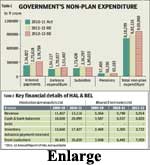In the last few months, the government has announced a number of measures to tackle the seemingly impossible task of containing the fiscal deficit in FY13 and to boost investor confidence. While the government has acknowledged that it will be difficult to contain the fiscal deficit at the budgeted level of 5.1 % of GDP, the revised estimate of 5.3% also does not inspire much confidence. The Kelkar Committee and a number of experts have put that number at closer to 6% of GDP.
 As the fiscal year draws to a close, the government needs to focus on containing non-plan expenditure. The bulk of the government?s non-plan expenditure is on defence, interest payments and subsidies, as detailed in Table 1.
As the fiscal year draws to a close, the government needs to focus on containing non-plan expenditure. The bulk of the government?s non-plan expenditure is on defence, interest payments and subsidies, as detailed in Table 1.
When one takes a closer look at the amount of money spent on defence and relate that to published financial information of a couple of defence sector public sector units (DPSUs), some interesting facts emerge. Hindustan Aeronautics Limited (HAL) and Bharat Electronics Limited (BEL) are two of the ?navaratnas? supplying significant amount of equipment to the Indian armed forces. Table 2 highlights some of the financial information from these entities? published accounts.
It is obvious from the table that a significant portion of the cash and bank balances of these companies is on account of the advances received from the customer i.e. the defence department. The amount of advance received as a proportion of revenue shot up in the case of BEL in 2010-11 and has remained at that higher level in 2011-12, while, in case of HAL, the advance amount represents almost three years of revenue. It looks like the defence ministry is possibly making advance payments to these PSUs as a means of ?using budgetary allocation?.
Even if one argues that advance payments from customers, based on the progress of work, is an accepted commercial norm in this industry, there is no denying that the ratio looks skewed in favour of the supplier and has become more favourable over the years. HAL & BEL have strong balance sheets and approved bank credit lines. Instead of depending on funding by sovereign customers, these entities should fund working capital needs through prudent bank borrowings. The advance amount received by DPSUs is anyway parked in fixed deposits while the government?s borrowing is increasing year after year, adding to a very high fiscal deficit.
To contain the deficit this year, the finance minister should ensure that no payment is made from the defence budget to HAL & BEL and ask them to utilise the advances already paid. There is a potential saving of R15,000-20,000 crore this year. In addition, the FM should look at taking back advances from both to the extent of, say, R20,000 crore, so that he actually gets his money back. Paying such huge advances and keeping it in bank deposits of the PSUs is absurd and a misuse of taxpayers monies.
The authors are with Aarin Capital Partners
















